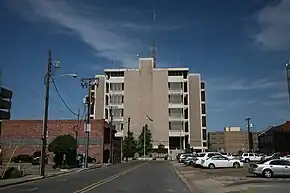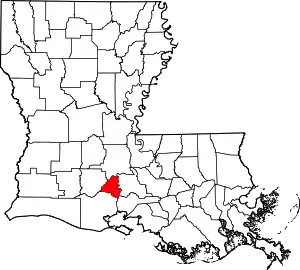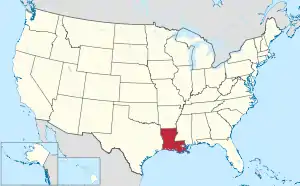Lafayette Parish, Louisiana
Lafayette Parish (French: Paroisse de Lafayette) is a parish located in the U.S. state of Louisiana. According to the 2020 U.S. census, the parish had a population of 241,753,[1] up from 221,578 at the 2010 United States census.[2] The parish seat is the city of Lafayette.[3] The parish was founded in 1823.[4] Since 1996, the city and parish have operated as a consolidated government.
Lafayette Parish | |
|---|---|
 Lafayette Parish Courthouse | |
 Location within the U.S. state of Louisiana | |
 Louisiana's location within the U.S. | |
| Coordinates: 30°13′N 92°04′W | |
| Country | |
| State | |
| Founded | January 17, 1823 |
| Named for | Marquis de la Fayette |
| Seat | Lafayette |
| Largest city | Lafayette |
| Government | |
| • President | Josh Guillory (R) |
| Area | |
| • Total | 269 sq mi (700 km2) |
| • Land | 269 sq mi (700 km2) |
| • Water | 0.5 sq mi (1 km2) 0.2% |
| Population (2020) | |
| • Total | 241,753 |
| • Density | 900/sq mi (350/km2) |
| Time zone | UTC−6 (Central) |
| • Summer (DST) | UTC−5 (CDT) |
| Congressional district | 3rd |
| Website | www |
Etymology
The city and parish of Lafayette were named in honor of the Marquis de Lafayette, the French general who took part in the Continental Army in the American Revolutionary War and financially aided it.[5]
Geography
Lafayette Parish is a part of the region of Acadiana in southern Louisiana, along the Gulf Coast. According to the U.S. Census Bureau, the parish has a total area of 269 square miles (700 km2), of which 269 square miles (700 km2) is land and 0.5 square miles (1.3 km2) (0.2%) is water.[6] It is the fifth-smallest parish in Louisiana by land area and third-smallest by total area.
Major highways
Adjacent parishes
- St. Landry Parish (north)
- St. Martin Parish (east)
- Iberia Parish (southeast)
- Vermilion Parish (south)
- Acadia Parish (west)
National protected area
- Jean Lafitte National Historical Park and Preserve (part, in Lafayette)
Cities
- Broussard
- Carencro
- Lafayette (parish seat and largest municipality)
- Scott
- Youngsville
Town
Demographics
| Census | Pop. | Note | %± |
|---|---|---|---|
| 1830 | 5,653 | — | |
| 1840 | 7,841 | 38.7% | |
| 1850 | 6,720 | −14.3% | |
| 1860 | 9,003 | 34.0% | |
| 1870 | 10,388 | 15.4% | |
| 1880 | 13,235 | 27.4% | |
| 1890 | 15,966 | 20.6% | |
| 1900 | 22,825 | 43.0% | |
| 1910 | 28,733 | 25.9% | |
| 1920 | 30,841 | 7.3% | |
| 1930 | 38,827 | 25.9% | |
| 1940 | 43,941 | 13.2% | |
| 1950 | 57,743 | 31.4% | |
| 1960 | 84,656 | 46.6% | |
| 1970 | 109,716 | 29.6% | |
| 1980 | 150,017 | 36.7% | |
| 1990 | 164,762 | 9.8% | |
| 2000 | 190,503 | 15.6% | |
| 2010 | 221,578 | 16.3% | |
| 2020 | 241,753 | 9.1% | |
| U.S. Decennial Census[7] 1790-1960[8] 1900-1990[9] 1990-2000[10] 2010-2019[2] | |||
| Race | Number | Percentage |
|---|---|---|
| White (non-Hispanic) | 150,745 | 62.24% |
| Black or African American (non-Hispanic) | 60,677 | 25.1% |
| Native American | 716 | 0.3% |
| Asian | 5,212 | 2.16% |
| Pacific Islander | 68 | 0.03% |
| Other/Mixed | 8,622 | 3.57% |
| Hispanic or Latino | 15,983 | 6.61% |
According to the 2020 United States census, there were 241,753 people, 94,490 households, and 59,937 families residing in the parish. According to the 2019 American Community Survey, there were 244,390 people living in the parish.[12] The racial and ethnic makeup of Lafayette Parish was 65.7% non-Hispanic white, 25.9% Black and African American, 0.2% American Indian and Alaska Native, 1.9% Asian, 0.3% some other race, 1.5% two or more races, and 4.6% Hispanic and Latino American of any race.[13] In 2020, the racial and ethnic makeup was 62.24% non-Hispanic white, 25.1% Black and African American, 0.3% American Indian and Alaska Native, 2.16% Asian, 0.03% Pacific Islander, 3.57% multiracial or some other race, and 6.61% Hispanic or Latino American of any race.
In 2019, the median age was 35.2 and 76.2% of the population were aged 18 and older; 12.7% of the population were aged 65 and older.[14] Of its population, 4.2% were foreign born, with the majority coming from Latin America, Asia, and Europe.[15] Among the population, 10.1% spoke another language other than English at home; Spanish was the second most-spoken language in 2019, and French was third.
There were 91,543 households at the 2019 census estimates, and 44.4% were married couples living together; 8.0% of households were cohabiting couples, 17.8% male households with no female present, 12.7% single-person households, and 29.7% female households with no female present. The average household size was 2.59 and the average family size was 3.22.[15] There was an employment rate of 62.5% and 28,206 businesses operating in the parish; 5,734 businesses were minority-owned and 2,774 were veteran-owned.
Out of the 102,491 housing units in 2019, the median gross rent was $874, and median housing value was $185,300.[14] At the 2019 American Community Survey, the median household income was $56,999; males had a median income of $54,653 versus $38,378 for females. An estimated 17.3% of the population lived at or below the poverty line.
Education
Lafayette Parish School System operates public schools for the parish.
Lafayette Parish is home to the University of Louisiana at Lafayette, Louisiana's second largest public university behind Louisiana State University. It is also home to the main campus of South Louisiana Community College (the parish is in the community college's service area),[16] a Remington College in Lafayette, a Blue Cliff College in Lafayette, an Aveda Institute, and a Louisiana Technical College in Lafayette.
Politics
The parish voters often supported Democratic presidential candidates before the 1970s, but the majority of conservative whites has trended Republican since that time.[17] Before 1965 and passage of the Voting Rights Act by the U.S Congress, most African Americans were disenfranchised, as they had been since 1898, when Louisiana passed a new constitution establishing barriers to voter registration and voting. They, along with poor white voters, were excluded from the political system. After regaining the power to register and vote, black voters tended to affiliate with and support national Democratic Party candidates.
The majority of the parish voted for the Republican presidential candidates from 1992 to 2020, and did so by generally increasing margins. The results in 2004 gave Republican George W. Bush 64% of the vote and 57,732 votes while Democrat John F. Kerry won 35% of the vote and 31,210 votes. In the 2008 election Lafayette Parish cast the majority of its votes for Republican John McCain. He won 65% of the vote and 62,055 votes. Democrat Barack Obama was strongly supported by African Americans and won 34% of the vote, some 32,145 votes.[18]
| Year | Republican | Democratic | Third party | |||
|---|---|---|---|---|---|---|
| No. | % | No. | % | No. | % | |
| 2020 | 72,519 | 63.32% | 39,685 | 34.65% | 2,317 | 2.02% |
| 2016 | 68,195 | 64.58% | 32,726 | 30.99% | 4,682 | 4.43% |
| 2012 | 64,992 | 65.89% | 31,768 | 32.21% | 1,882 | 1.91% |
| 2008 | 62,055 | 64.88% | 32,145 | 33.61% | 1,442 | 1.51% |
| 2004 | 57,732 | 64.20% | 31,210 | 34.71% | 981 | 1.09% |
| 2000 | 48,491 | 61.94% | 27,190 | 34.73% | 2,612 | 3.34% |
| 1996 | 36,419 | 48.91% | 32,504 | 43.65% | 5,545 | 7.45% |
| 1992 | 32,406 | 45.16% | 28,583 | 39.83% | 10,773 | 15.01% |
| 1988 | 36,648 | 59.44% | 24,133 | 39.14% | 877 | 1.42% |
| 1984 | 44,344 | 68.80% | 19,265 | 29.89% | 849 | 1.32% |
| 1980 | 31,429 | 58.72% | 19,694 | 36.79% | 2,403 | 4.49% |
| 1976 | 22,805 | 52.19% | 19,918 | 45.58% | 976 | 2.23% |
| 1972 | 22,939 | 69.10% | 8,740 | 26.33% | 1,519 | 4.58% |
| 1968 | 10,669 | 35.12% | 7,983 | 26.28% | 11,723 | 38.59% |
| 1964 | 12,398 | 46.11% | 14,487 | 53.89% | 0 | 0.00% |
| 1960 | 6,047 | 26.66% | 14,132 | 62.30% | 2,505 | 11.04% |
| 1956 | 6,711 | 57.10% | 4,695 | 39.95% | 347 | 2.95% |
| 1952 | 6,470 | 50.10% | 6,443 | 49.90% | 0 | 0.00% |
| 1948 | 2,068 | 27.21% | 1,787 | 23.52% | 3,744 | 49.27% |
| 1944 | 742 | 13.39% | 4,801 | 86.61% | 0 | 0.00% |
| 1940 | 1,850 | 22.64% | 6,323 | 77.36% | 0 | 0.00% |
| 1936 | 306 | 6.28% | 4,570 | 93.72% | 0 | 0.00% |
| 1932 | 291 | 6.75% | 4,019 | 93.21% | 2 | 0.05% |
| 1928 | 592 | 15.62% | 3,197 | 84.38% | 0 | 0.00% |
| 1924 | 531 | 28.97% | 978 | 53.36% | 324 | 17.68% |
| 1920 | 1,045 | 55.94% | 823 | 44.06% | 0 | 0.00% |
| 1916 | 73 | 4.52% | 1,066 | 66.01% | 476 | 29.47% |
| 1912 | 244 | 23.95% | 646 | 63.40% | 129 | 12.66% |
Law enforcement
| Lafayette Parish Sheriff's Office | |
|---|---|
| Common name | Sheriff's Office |
| Abbreviation | LPSO |
| Motto | "Serving the community with courtesy, professionalism, and respect." |
| Jurisdictional structure | |
| Legal jurisdiction | Parish (County) |
| General nature | |
| Operational structure | |
| Headquarters | Lafayette, Louisiana |
| Deputy Sheriffs | 500 |
| Unsworn employees | 250 |
| Agency executive |
|
| Divisions | 7
|
| Facilities | |
| Stations | 4 |
| Jails | 1 |
| Patrol Cars | Ford Crown Victoria Police Interceptor, Chevrolet Impala |
| Patrol Motorcycles | Harley Davidson |
| Website | |
| http://www.lafayettesheriff.com/ | |
The Lafayette Parish Sheriff's Office (LPSO) is the sheriff's department in Lafayette Parish, Louisiana. The department, headed by Sheriff Mark T. Garber, consists of around 750 sworn and non-sworn employees. Although the LPSO's jurisdiction consists of the entire parish of Lafayette, in order to not duplicate services provided by local city police, the primary patrol area is the unincorporated areas of the parish. It also runs the Lafayette Parish Correctional Center. The LPSO is CALEA (Commission on Accreditation for Law Enforcement Agencies) accredited and has taken part in Operation FALCON.
In 2003, the Lafayette Parish Sheriff's Office joined with the University of Louisiana to create ALETA, the Acadiana Law Enforcement Training Academy. This academy trains new LPSO deputies and UL Police officers, as well as recruits from several other police agencies in South Louisiana, to become P.O.S.T. certified law enforcement officers. The program is an eleven-week course that provides physical training and conditioning along with classroom instruction.
Lafayette Parish is further served by the Lafayette Police Department, University of Louisiana at Lafayette Police Department, and the Lafayette City Marshal.
National Guard
The HQ and other units of the 256th IBCT reside in the city of Lafayette, Louisiana. This unit of over 3,500 Soldiers has deployed twice to Iraq, 2004-5 and 2010. This unit has also responded to disasters such as: Hurricane Katrina, Hurricane Gustav, Hurricane Isaac, and the Gulf of Mexico Oil Spill.
Notable people
- Lauren Daigle, (born 1991), Grammy-nominated CCM singer
- Jefferson Caffery, (1886-1974), U.S. Ambassador to El Salvador, Colombia, Cuba, Brazil, France and Egypt
- Benjamin Flanders, (1816-1896), politician, Alderman of New Orleans (1847-1852), founder of the Republican Party of Louisiana in 1864, appointed governor of Louisiana in 1867, retired in 1880s to his Ben Alva plantation here
- Jerry Luke LeBlanc (born 1956), former state legislator and vice president of administration and finance at the University of Louisiana at Lafayette
- Alexandre Mouton, (1804–1885), born in Attakapas, United States Senator and Governor of Louisiana.[20]
- Frank Schmitz, (1945-1966), four time NCAA champion gymnast and silver medal winner at the 1965 Trampoline World Championships.
- Dustin Poirier, (born 1989), professional mixed martial artist. Ultimate Fighting Championship Lightweight competitor and former Interim UFC Lightweight Champion.
See also
References
- "QuickFacts: Lafayette Parish, Louisiana". U.S. Census Bureau.
- "State & County QuickFacts". United States Census Bureau. Archived from the original on June 29, 2011. Retrieved August 10, 2013.
- "Find a County". National Association of Counties. Retrieved June 7, 2011.
- "History". Lafayette County Sheriff's Office. Retrieved September 4, 2014.
- Gannett, Henry (1905). The Origin of Certain Place Names in the United States. Government Printing Office. pp. 178.
- "2010 Census Gazetteer Files". United States Census Bureau. August 22, 2012. Archived from the original on September 28, 2013. Retrieved September 1, 2014.
- "U.S. Decennial Census". United States Census Bureau. Retrieved September 1, 2014.
- "Historical Census Browser". University of Virginia Library. Retrieved September 1, 2014.
- "Population of Counties by Decennial Census: 1900 to 1990". United States Census Bureau. Retrieved September 1, 2014.
- "Census 2000 PHC-T-4. Ranking Tables for Counties: 1990 and 2000" (PDF). United States Census Bureau. Retrieved September 1, 2014.
- "Explore Census Data". data.census.gov. Retrieved December 28, 2021.
- "2019 Parish Population Estimates". data.census.gov. Retrieved July 31, 2021.
- "2019 Demographic and Housing Estimates". data.census.gov. Retrieved July 31, 2021.
- "Geography Profile: Lafayette Parish, Louisiana". data.census.gov. Retrieved July 31, 2021.
- "2019 Selected Social Characteristics". data.census.gov. Retrieved July 31, 2021.
- "Our Colleges". Louisiana's Technical and Community Colleges. Retrieved June 3, 2021.
- David Leip's Election Atlas
- The New York Times electoral map
- Leip, David. "Dave Leip's Atlas of U.S. Presidential Elections". uselectionatlas.org. Retrieved April 28, 2018.
- Who Was Who in America, Historical Volume, 1607-1896. Chicago: Marquis Who's Who. 1963.
External links
- Lafayette Consolidated Government
- Lafayette Economic Development Authority
- Lafayette Convention and Visitors Commission
- Lafayette Public Library
- Lafayette Parish Clerk of Court
- Lafayette Parish American History and Genealogy Project
Geology
- Heinrich, P. V., and W. J. Autin, 2000, Baton Rouge 30 x 60 minute geologic quadrangle. Louisiana Geological Survey, Baton Rouge, Louisiana.
- Heinrich, P. V., J. Snead, and R. P. McCulloh, 2003, Crowley 30 x 60 minute geologic quadrangle. Louisiana Geological Survey, Baton Rouge, Louisiana.